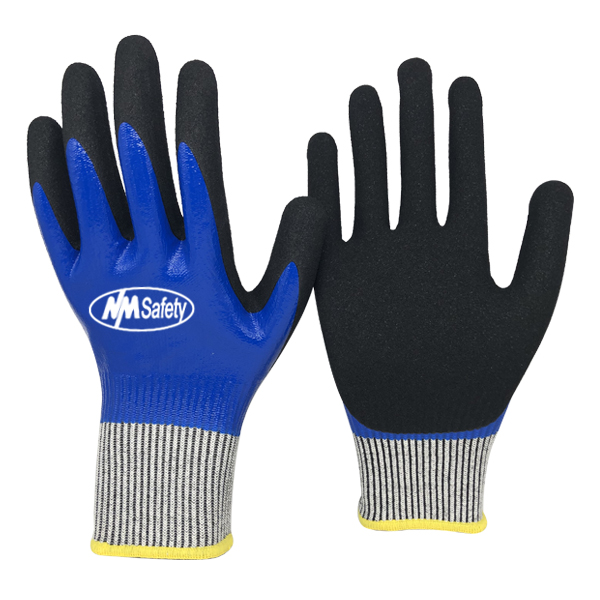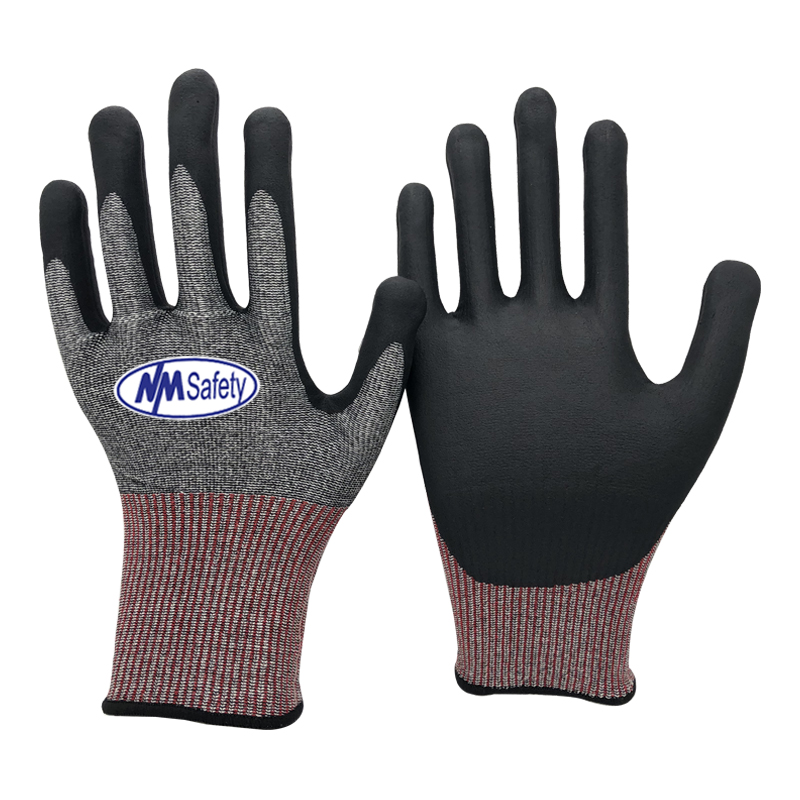7 Advantages of Safety Work Gloves in Industries
By hqt

Moreover, safety work gloves are becoming more and more popular in all areas of activity where there is a question of high-quality and reliable protection of the skin of the hands. Initially, their production caused by the emerging and growing shortage of natural rubber.
But it soon became apparent that nitrile products are becoming an excellent alternative to latex products, as they are in no way inferior. Moreover, they even have their own advantage - the absence of allergic reactions to natural protein in the composition of rubber.
What are nitrile safety work gloves?
- Nitrile is a substitute for natural rubber. A necessity caused by the growing demand for latex;
- Composition: Nitrile butadiene vulcanized rubber alloy. The content of latex is not more than 5%;
- Nitrile gloves are durable, wear-resistant and puncture-resistant;
- Color - more often blue, less often pink, black, purple;
- General characteristics - durable and reliable gloves!
What are latex gloves?
- Latex is an emulsion of rubber particles in an aqueous solution;
- Rubber is a natural material. Produced from the sap of the heave tree;
- Latex gloves stretch well, fit the hand, soft and elastic;
- Latex safety work gloves are resistant to acids and alkalis;
- Disadvantages - can cause allergies (about 10% of cases);
- Latex gloves are used for work where tactile sensations need;
- Color - white, yellow (butter);
- General characteristic - comfortable gloves, but not for everyone!
What are vinyl gloves?
- Vinyl is a cheap substitute for latex. Product material - polyvinyl chloride, synthetic copolymer;
- Vinyl gloves are resistant to acids, caustics, bases and alcohols;
- Vinyl gloves are hypoallergenic, do not cause allergies;
- Disadvantages - not elastic (stretch poorly), for short-term work;
- Recommended for short, risk-free procedures without contact with blood;
- Color - more often transparent, but there are colored ones;
- General characteristic - cheap safety work gloves for work with minimal stress.
Nitrile gloves are wear-resistant, not afraid of tears, punctures and other mechanical damage. This fact contributes to the calm and comfortable work of, for example, medical workers, as it adds confidence in the movements. Nitrile gloves perfectly protect hands from most mechanical and chemical influences and irritants.
Also, nitrile gloves have sufficient elasticity and stretch ability so that the person working in them does not feel stiffness in the movements of the fingers and fatigue in the hands. The textured surface helps to use and securely hold small objects and tools. Safety work gloves are very important, for example, in the work of dentists or cosmetologists.
Advantage of Nitrile gloves
nitrile gloves do not contain powder in the inside, which in itself is an absorbent and a place for infection and microorganisms to accumulate, which can lead to irritation on the skin of the hands. Nitrile gloves, unlike other gloves, are easy to put on and take off without additional dusting. Agree, it is pleasant and convenient.
Nitrile and latex are the pros and cons of popular stretch gloves
The word gloves come from the word "finger" (finger). Nitrile or latex safety work gloves are a type of equipment that protects the hands and skin of the hands from contact with harmful and dangerous factors of the working environment and the labor process.
Moreover, disposable gloves are indispensable helpers both for workers in the cleaning services market, in the construction industry, the food industry, cosmetology, etc., and for household use when cleaning (wet and / or dry) and for use in medicine and pharmacology.
Depending on a number of features, such as: the material from which a particular model is made, the presence or absence of spraying, the scope, the gloves have different characteristics.
Moreover, the right choice of gloves is the key to comfort and successful work. The first thing you should pay attention to is the material used for manufacturing. The most common options are latex and nitrile.
Nitrile and latex safety work gloves: features and differences
Latex gloves are made from latex, which is the milky sap of rubber plants, with the addition of many different ingredients (accelerators, activators, fillers, surfactants, stabilizers, etc.).
This type of gloves has a long history of use and consider the most popular, overtaking nitrile and vinyl models. Latex is the traditional choice of medical institutions. However, despite the undeniable advantages of using this material, latex gloves also have a number of disadvantages.
Latex: pros and cons
The advantage for which latex safety work gloves are especially valued in medicine is a high level of sensitivity and excellent elasticity. Moreover, it is these characteristics that make latex the best choice for surgical operations. Latex gloves comfortably "sit" on the hand, quickly adapt to the hand and provide a secure grip on the tool (in a dry or wet environment).
However, there is a drawback that seriously affects the reputation of latex gloves - this is the possibility of allergies. Natural rubber proteins often act as allergens, causing a reaction in people with sensitive skin. Allergies can occur both in those who use safety work gloves (for example, surgeons or cosmetologists), and in people with whom they come into contact (patients or clients of a beauty salon, etc.).
Also, the disadvantages of latex gloves include excessive elasticity, which can become a problem if latex uses in cosmetology (for example, during the sugaring procedure).
Moreover, Nitrile gloves are made from nitrile, an artificial, synthetic rubber (also known as acrylonitrile butadiene rubber), which is a replacement for natural rubber.
Latex gloves: 100% hypo allergenicity
The main advantage of nitrile gloves is their 100% hypo allergenicity. It is this feature of nitrile that makes it a serious competitor to the latex we use to.
However, even here it is necessary to observe several rules recommended by the manufacturer. First: do not wear nitrile gloves for more than two hours in a row and second: follow the necessary skin care before and after using nitrile gloves.
Nitrile safety work gloves: pros and cons
Synthetic nitrile gloves provide reliable protection against harsh chemicals. Moreover, when working with serious household or industrial chemicals, nitrile gloves prefer over their natural latex counterparts. Nitrile is also a more durable material that is puncture resistant, while the textured surface of the gloves provides a comfortable and secure grip.
The disadvantages of nitrile models include their low sensitivity - in comparison with latex, nitrile gloves cannot guarantee 100% comfortable sensations.

